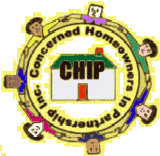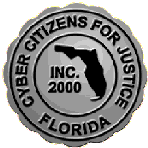 |
CHIP
continues to push
Posted 04/04/03 By Lee Helscel Article Courtesy of South Marion Citizen |
 |
 |
CHIP
continues to push
Posted 04/04/03 By Lee Helscel Article Courtesy of South Marion Citizen |
 |
| During the March 27 CHIP meeting, two
board of directors seats were filled, membership needs and this year’s
legislative agenda were discussed. Fred Board and A.J. Broznick were selected
by vote to serve as CHIP board members for the upcoming year.
The treasurer’s report by Barbara Goodis revealed that the Concerned Homeowners in Partnership operated at a deficit last year. There have been a few expenses for the creation of the grassroots organization’s Web site and membership recruitment which caused a $634 loss, she said. The other part of the problem is loss of revenue due to a drop in membership dues. At this time last year, CHIP had 307 members. This year’s numbers have diminished to 107, she said. President Channing Gerber suggested that a lot of early members may have been discouraged with the amount of time it takes to get the Florida legislature to enact changes to state homeowner laws. CHIP was formed in 2000 and has been lobbying the state legislature to change the laws which govern developers and homeowner associations in deed-restricted communities. In an effort to expand CHIPs membership and effectiveness the group has been trying to solicit new members since last summer. A rented space at Market of Marion was a failure and a lesson learned, Gerber said. It was probably not the right venue for the audience CHIP is trying to reach. Only a few new members resulted from participation in the Annual Parade of Senior Services at Paddock Mall on February 7. There were many visitors at the CHIP table and Gerber considers the effort successful. In talking with visiting residents of mobile home and condominium communities it was learned that regulations protecting those owners are not being effectively enforced. Residents of mobile home communities and condominiums in Florida have a laws and a state agency, The Division of Land Sales, Condominiums, and Mobile Homes, a part of the Department of Business and Professional Regulation, to regulate homeowners associations and developers, according to Gerber. CHIP is introducing proposed legislation which would cause developers of deed-restricted communities and homeowner groups to be responsible for their actions to a similar board. The group wants developers and associations to account for fees collected for amenities and mandated fees. In reporting progress with this year’s legislative sponsors, Gerber wasn’t encouraging. The group may have to send representatives to Tallahassee to lobby its bill, he said. One state representative sent CHIPs draft back with recommendations that the regulatory agency portion be stricken. With that taken out, there is no reason to change the law. Without a regulatory agency there would be no way to enforce changes, if they could be made, he said. In order to continue its drive to address legislative reform of homeowner law, CHIP needs volunteers to help write the newsletter, The CHIP News, and gather information, according to board member Fanny Vail. CHIP has formed and alliance with Cyber Citizens for Justice, a Florida group that is also introducing homeowner legislation of its own, and they have been working to promote each other’s efforts. Associations in Stonecrest and The Villages have also been talking with CHIP about joining forces, Fann said. One of CHIP’s goals is to create a statewide federation that would allow communities to work on a local level with state agencies to get deed-restricted property problems solved, she said. In the meantime, CHIP needs to recruit more active members and attract more to the meetings. There were only a couple dozen members present for Thursday’s Annual Membership Meeting and election of officers. Director Pat Gabriel suggested presenting guest speakers to talk on subjects common to residents in deed-restricted communities at meetings. “What we are doing is legislative and that’s boring,” she said. Gerber later questioned whether the evening meeting hour of 7 o’clock was also an attendance factor. |
 |
 |